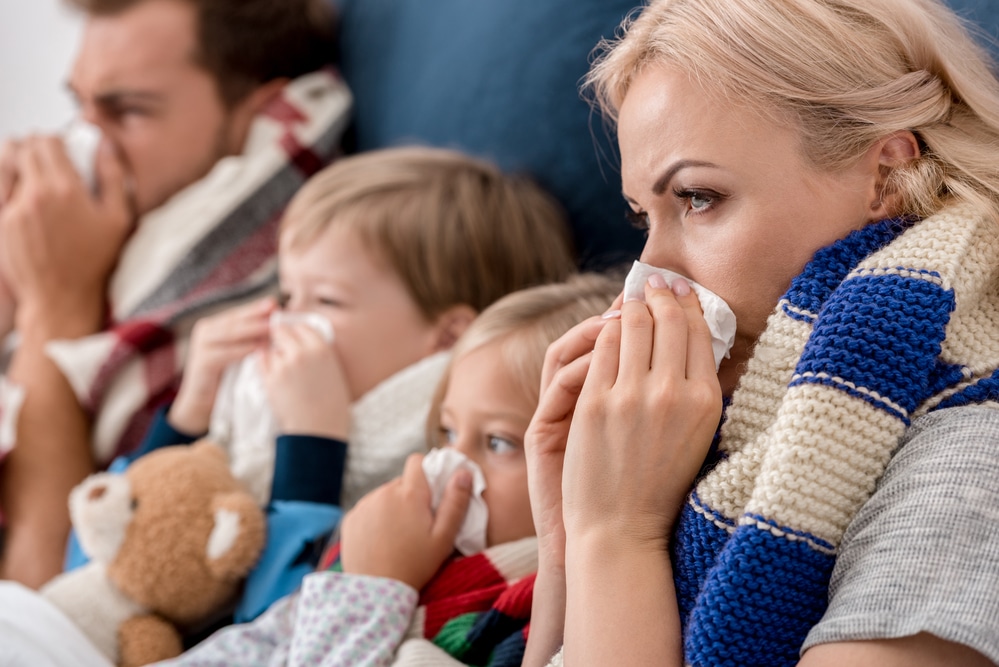Influenza, commonly known as the flu, is caused by the influenza virus. There are three types of influenza viruses: A, B, and C. Influenza A and B viruses are responsible for most seasonal flu epidemics, while influenza C virus causes milder respiratory illness.
Influenza viruses are highly contagious and can be transmitted through droplets when an infected person talks, coughs, or sneezes. The virus can also spread by touching a surface contaminated with the virus and then touching one’s mouth, nose, or eyes.
The flu virus can mutate and change, making it difficult for the body’s immune system to recognize and fight off the virus. This is why a new flu vaccine is developed every year to protect against the most common strains of the virus.
Certain groups of people are at a higher risk of developing complications from the flu, including young children, elderly individuals, pregnant women, and people with weakened immune systems. It is important for these individuals to take extra precautions to prevent the spread of the virus and seek medical attention if they experience flu-like symptoms.
Flu Symptoms
Physical Symptoms
The flu is a viral infection that affects the respiratory system. Symptoms can vary from person to person, but common physical symptoms include:
- Fever
- Cough
- Sore throat
- Runny or stuffy nose
- Body aches
- Headache
- Chills
- Fatigue
These symptoms can come on suddenly and can be severe, making it difficult to carry out daily activities. In some cases, the flu can lead to complications such as pneumonia, which can be life-threatening.
Mental Symptoms
In addition to physical symptoms, the flu can also cause mental symptoms. These can include:
- Confusion
- Difficulty concentrating
- Mood changes
- Irritability
- Anxiety
These symptoms can be particularly problematic for children, the elderly, and those with underlying mental health conditions.
It is important to note that not everyone with the flu will experience all of these symptoms. Some people may only experience a few, while others may have more severe symptoms. If you suspect that you or someone you know has the flu, it is important to seek medical attention as soon as possible.
Treatment for the flu typically involves rest, hydration, and over-the-counter medications to manage symptoms. In some cases, antiviral medications may be prescribed to help shorten the duration of the illness and reduce the risk of complications. It is important to follow the advice of a healthcare professional when seeking treatment for the flu.
Flu Treatments
Flu is a viral infection that can cause severe respiratory symptoms. There are various treatments available to manage the symptoms of flu. The treatment options can be classified into two categories: Home Remedies and Medical Treatments.
Home Remedies
Home remedies are simple measures that can be taken to alleviate the symptoms of flu. Some of the commonly used home remedies are:
- Rest: Getting plenty of rest is essential to help the body fight the infection. It is recommended to stay home and avoid going to work or school until the symptoms subside.
- Hydration: Drinking plenty of fluids, such as water, tea, and soup, can help prevent dehydration and relieve congestion.
- Steam: Inhaling steam from a hot shower or a bowl of hot water can help loosen mucus and relieve congestion.
- Saltwater gargle: Gargling with saltwater can help soothe a sore throat and reduce inflammation.
Medical Treatments
Medical treatments for flu are recommended for individuals who are at high risk of developing complications or who have severe symptoms. Some of the commonly used medical treatments are:
- Antiviral medications: These medications can help reduce the severity and duration of flu symptoms. They work by blocking the replication of the virus in the body.
- Pain relievers: Over-the-counter pain relievers, such as acetaminophen and ibuprofen, can help reduce fever and relieve body aches.
- Decongestants: Decongestants can help relieve nasal congestion and reduce swelling in the nasal passages.
- Cough suppressants: Cough suppressants can help reduce the frequency and severity of coughing.
It is important to note that antibiotics are not effective in treating flu, as it is caused by a virus and not bacteria. Additionally, it is recommended to consult a healthcare professional before taking any medication, especially if you have any underlying medical conditions or are pregnant.
Prevention of Flu
Preventing the flu is the best way to avoid getting sick. There are several steps individuals can take to reduce their risk of catching the flu virus.
Vaccination
Getting vaccinated is the most effective way to prevent the flu. The flu vaccine is updated every year to protect against the strains of the virus that are most likely to be circulating. Individuals should get vaccinated every year, ideally before the flu season begins.
Hygiene
Practicing good hygiene can also help prevent the flu. Individuals should wash their hands frequently with soap and water for at least 20 seconds, especially after coughing, sneezing, or blowing their nose. If soap and water are not available, they should use an alcohol-based hand sanitizer.
Avoiding Crowds
Avoiding crowds during flu season can also help prevent the spread of the virus. Individuals should avoid close contact with people who are sick and stay home if they are feeling unwell.
Healthy Lifestyle
Maintaining a healthy lifestyle can also help prevent the flu. Eating a balanced diet, getting enough sleep, and staying physically active can all boost the immune system and reduce the risk of getting sick.
Other Measures
Other measures individuals can take to prevent the flu include:
- Covering the mouth and nose with a tissue when coughing or sneezing
- Avoiding touching the face, especially the eyes, nose, and mouth
- Cleaning and disinfecting frequently touched objects and surfaces, such as doorknobs, keyboards, and phones
- Wearing a mask in crowded public places or when caring for someone who is sick
By taking these steps, individuals can reduce their risk of catching the flu and stay healthy during flu season.
When to See a Doctor
If a person experiences flu-like symptoms, they should take it seriously and seek medical attention if necessary. Influenza can lead to serious complications, such as pneumonia, especially in people with weakened immune systems, older adults, and young children.
The following are some signs that indicate a person should see a doctor:
- Difficulty breathing or shortness of breath
- Chest pain or pressure
- Confusion or sudden dizziness
- Severe or persistent vomiting
- High fever that does not respond to over-the-counter medication
- Symptoms that improve but then return with a fever and a worse cough
In addition, people who are at high risk of developing complications from the flu should see a doctor if they experience any flu-like symptoms. This includes people who have chronic medical conditions such as diabetes, heart disease, or lung disease, pregnant women, and people over the age of 65.
It is important to note that antiviral medications are most effective when taken within 48 hours of the onset of symptoms. Therefore, people who suspect they have the flu should seek medical attention as soon as possible.





